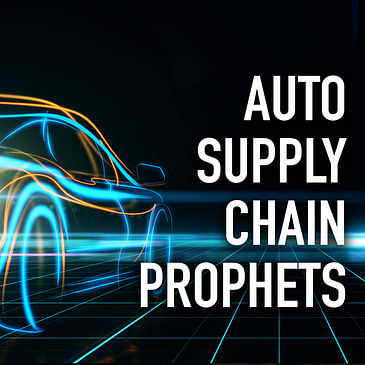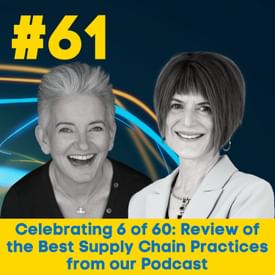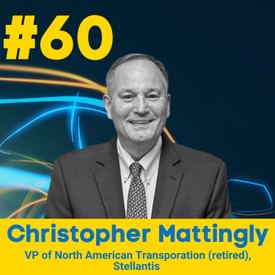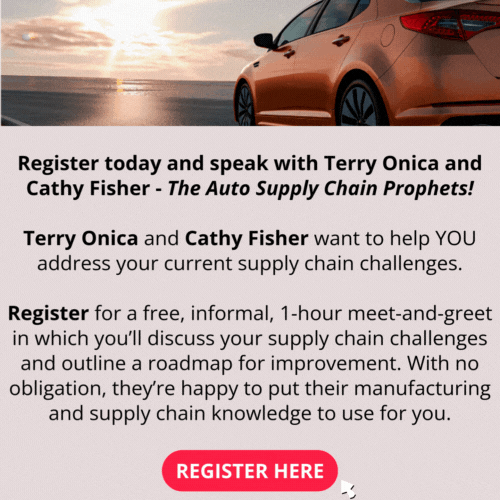As we enter 2024, the Auto Supply Chain Prophets podcast celebrates another successful year as the go-to source for industry knowledge and content for our dedicated audience. For two seasons and across 47 episodes, our podcast has remained committed to helping automotive manufacturers, suppliers, and industry professionals navigate the complex landscape of the auto supply chain.
In this special episode, host and producer Jan Griffiths reflects on the key themes that shaped our 2023. The Auto Supply Chain Prophets explored various aspects of the auto supply chain throughout this journey. We've covered critical topics like global standards, ESG, automation, digitization, and risk management. Our dedication to keeping our audience informed and prepared is evident in the episodes dedicated to future-focused topics like EV adoption and the importance of gamification in supply chain education, putting us at the forefront of industry discussions.
As we bid farewell to 2023, the Auto Supply Chain Prophets podcast remains steadfast in its commitment to delivering content that matters and encourages the audience to share their thoughts and suggestions for topics they want to explore in the coming year.
Themes discussed in this episode:
- Podcasting challenges and milestones
- The complexity of the auto supply chain landscape
- Emerging trends in the auto supply chain
- The critical role of technology in the auto supply chain
- Implementing automation and digitization
- Leveraging risk management strategies for supply chain resilience
- Simplifying complex standards
- MMOG/LE and IATF intersection
- Impact of EV adoption
- The future of supply chain education
- The Impact of EQMS (Enterprise Quality Management System)
Featured on this episode:
Name: Jan Griffiths
Title: President and Founder, Gravitas Detroit
About: A veteran executive in the automotive industry, Jan previously served as chief procurement officer for a $3 billion, Tier 1 global automotive supplier. As the president of Gravitas Detroit, Jan provides online courses, speeches, podcasts, and workshops to break the mold of command-and-control leadership to help you unleash the potential of your team and allow authentic leadership to thrive.
Connect: LinkedIn
Mentioned in this episode:
- Episode with Tanya Bolden: How MMOG/LE Is Transforming the Automotive Supply Chain
- Episode with Alexis Scipio: ESG in the Automotive Industry: Embracing Sustainability for Global Supply Chains
- Hosts only episode with Cathy Fisher and Terry Onica: Speeding Past Spreadsheets and Silos: The Intersection of IATF and MMOG/LE
- An episode with Mike Payionk: Why Automating your QMS Improves Your Supply Chain Performance
- Episode with Anthony Emery: Building a Future-Ready Supply Chain through Digitization, Sustainability, and Diversity
- Episode with Kevin Shayer: Transforming the Auto Supply Chain Workplace Through Engagement, Communication, and Gamification
- QAD Redzone
- An episode with Phil Ideson: 10x Impact: Revolutionizing the Role of Procurement
- The Art of Procurement Podcast
- Episode with Naseem Malik: Shaping the Future: Why Talent Development Is Paramount in Automotive Supply Chains
- Episodes with Reshoring Institute, Founder and Executive Director, Rosemary Coates: Part 1 and Part 2
- Episode with Thomas Kull: Preparing the Next Generation of Supply Chain Leaders through Innovative Education, Gamification, and Talent Focus
- Episode with Bill Hurles: Preparing for Post-Strike Success in Automotive Supply Chains
- Episode with Paul Eichenberg: UAW Strike, Supply Chain Turmoil, and Their Role in the EV Journey
- Episode with Michael Robinet: How electric vehicles are transforming supply chain dynamics
- Episode with Andreas Bareid: Navigating Supply Chain Challenges in the EV Startup World
- 24 Essential Supply Chain Processes
- White Paper for Leveraging Risk Management in Automotive
- White Paper for Operational Readiness
Episode Highlights:
[00:37] Celebrating success and metrics overview: Jan opens the episode by celebrating a successful year for the podcast, highlighting the podcast's achievement of surpassing 5,000 downloads and the publication of 47 episodes. Jan set the stage for a metrics overview and a behind-the-scenes look at the podcast's journey.
[04:40] Reflecting on past episodes: Jan delves into a retrospective exploration of the past episodes, from discussions on ESG and automation to in-depth interviews with industry leaders. Jan offers listeners a recap of the diverse topics covered throughout the year.
[19:36] Plans for 2024: With an eye on the future, Jan provides a sneak peek into the upcoming discussions, signaling a continued focus on supply chain digitization, AI, ESG, and supply risk management.
[Transcript]
[00:00:00] Jan Griffiths: Welcome to the Auto Supply Chain Prophets Podcast, where we help you prepare for the future in the auto supply chain. I'm Jan Griffiths, your co-host and producer.
[00:00:13] Cathy Fisher: I'm Cathy Fisher, your podcast host. Our mission is to help automotive manufacturers recognize, prepare for, and profit from whatever comes next in the auto supply chain.
[00:00:23] Terry Onica: I'm Terry Onica, your podcast host. We'll be giving you best practices and key supply chain insights from industry leaders.
[00:00:29] Jan Griffiths: Because the auto supply chain is where the money is. Let's dive in.
[00:00:37] Jan Griffiths: Hello and welcome to another episode of the Auto Supply Chain Prophets podcast. And today we are going to take a look back into 2023 and look at some emerging trends and then look into the future. Because, after all, this podcast is called Auto Supply Chain Prophets for a reason. Now, we're not psychics or futurists, but we do help auto manufacturers, suppliers, and others in the auto supply chain, recognize, prepare for, and profit from whatever comes next. Auto Supply Chain Prophets gives you timely and relevant insights and best practices from automotive industry leaders. That's our mission, and we are staying true to our mission.
[00:01:26] First, let's take a look at the metrics, shall we? Podcasting is an interesting field. It's difficult to get your arms around the numbers. Gosh, how many times have you heard that in supply chain, right? But let's take a look at the numbers. So, in 2023 we passed a significant milestone, 5, 000 downloads. You might think, okay, so what's the significance of that? And we've published 47 episodes. Well, let me tell you why that's significant. Most podcasts fail before they hit the 10th episode. Why? Because it's a lot of work and you have to be committed. You have to be committed to your audience. And I can tell you as the co-host and producer of this podcast, we are 100 percent committed to providing you, our loyal audience with the content that you need.
[00:02:24] Did you know? There are over 5 million podcast shows out there, 5 million. I'm not talking episodes, shows. Think of a show as the umbrella, and then the episodes fall underneath that umbrella. Of those 5 million shows, only 352,000 are consistently active. What that means is that they've published an episode within the last 30 days. That's kind of shocking, isn't it? So that's why, yeah, it's significant that we passed 5, 000 downloads and we're at 47 episodes and we're staying strong. We're also consistently in the top 50 percent of podcasts. What does that mean? Well, it means we get 32 downloads in the first seven days of publishing an episode. Now, that's kind of a podcasting industry standard that we measure ourselves by. And all of that is nice, but our mission isn't about that, it's not. It's about you. It's about serving you. It's about giving you the content that you need.
[00:03:33] So, let's take a look back into 2023 and take a look at some of the emerging trends in the episodes that we produced in 2023. Before we do that, let's talk a little bit about supply chain. What is it? What is the definition of supply chain? I have seen supply chain defined so many different ways. In some organizations, it encompasses the manufacturing operations, as well as materials, quality, supplier quality, purchasing, all of it. And I've seen it defined narrowly, as what we used to call the traditional materials function. And anything and everything in between. Well, if you want to provide yourself and your organization with a nice comprehensive look at supply chain, and more importantly, the 24 Essential Supply Chain Processes, we've got you covered. We've got a download on our podcast website and everything I talk about in this episode, we'll have a link in the show notes for you.
[00:04:40] So, now that we got that out of the way, let's take a look into 2023. One of the emerging trends that we see is ESG. ESG is clearly on your mind. We talked to two experts in the field, Alexis Scipio, and also Tanya Bolden from AIAG. With Alexis, we talked about the significance of ESG in the auto industry, the complexity of the global ESG standards, and oh boy, are they complex. The importance of cross-functional collaboration in effectively addressing ESG requirements. Now, I remember back in the day when ESG first came along, it was a bit of a hot potato. Everybody passed it around because nobody wanted to own it. Because it doesn't fall neatly into one silo function or category, now does it? But it is gaining traction and importance and significance in our industry. So, I would encourage you to listen to the episode with Alexis and also the episode with Tanya Bolden from AIAG.
[00:05:45] We talked a lot in 2023 about the changes to MMOG/LE and how ESG is now incorporated into these standards. So, if you thought that it was something that you could push off, or it was sort of a necessary evil think again. That's no longer the case. It's here, it's real, and it's embedded into the standard.
[00:06:05] And we talked a lot with Tanya Bolden about that exact issue, but we took it a step further, and we talked to our very own expert and co-host, Cathy Fisher, about the intersection of MMOG/LE and IATF. Now, you've heard me say many times, I'd rather have an ice pick in the forehead than have to go through these standards and specifications and understand where they intersect. But you know what? You'll be pleased to know we've done that work for you. We've provided a document so that you can see the intersection. And that, hopefully, that'll take hours of work of an arduous task out of your schedule. And we learned that MMOG/LE does far more than bring visibility to an organization's supply chain process. We talked a lot about how it actually reduces inventory and improves customer satisfaction. So often these standards are, again, thought of as a necessary evil, but they're not. If we take them to heart, if we follow them, if we make them a reality in our business. Yes, they will have a bottom-line impact.
[00:07:14] Another emerging trend that we see is the topic of automation and digitization. That's clearly at the front of your agenda. We had a fabulous interview with Mike Payionk from Penn Engineering. He says, with great success comes great complexity, and isn't that the truth? And we focused on his implementation of an EQMS—an enterprise quality management system. As automotive supply chains acquire businesses and add customers, choosing the right EQMS really jumpstart a company's trajectory. We've got a competitive landscape out there filled with actors racing to leverage paradigm-shifting technologies. You really getting ahead of the game with an EQMS is more important than ever. Mike is one of those guys. He's very down to earth. He's real. He has been right down in the weeds, in the details. He rolls up his sleeves and he shares with us the challenges and triumphs. From his epic five-year journey to automate processes, standardize best practices, and consolidate data at all twelve of his organization's facilities around the world. An impressive upfront lift. Choosing and mastering a powerful EQMS. And right now, that system purrs like a dream. And as he says, it's absolutely worth it. Now, I've worked in many companies where trying, you know, if you think trying to get the material systems and the purchasing systems into one system is difficult, try doing it with a quality management system. I don't know why, but that always seems to be 10 times more difficult. But Mike shares a lot about his journey. We loved that episode with Mike.
[00:09:10] But then another thing that's on your mind regarding the subject of automation and digitization, is this idea of proactive planning. And we talked to Anthony Emery of PHINIA, the spinoff from BorgWarner, and he plays in the aftermarket business, and we all know how difficult aftermarket can be. The complexity of the number of parts. Ever-changing demand. How to forecast demand is such a problem in the aftermarket business. But Antony's experience offers a unique perspective on the complexities of aftermarket supply chain management and the digitization of operations. And he talks about exactly what he's doing to harness the information that he needs for accurate forecasting.
[00:10:00] Then, there's the Redzone episode. Now, if you don't know what Redzone is, you definitely need to take a look at it. I'm enthralled with the genius of Redzone, how they've been able to leverage technology that we use every day and make it work on the shop floor. How often have you gone into a company, into a tier one, and particularly if you think about Gen Z coming into the workforce, and you're stuck with this green screen; this clunky thing. You don't really know how it works. You don't understand the backend. You don't understand the technology and it feels weird and it feels strange. But imagine if you could take a system that looks and feels like a system that you use every day on your iPad, and make that work on the shop floor. Well, Redzone did exactly that. And we talked to Kevin Shayer from Allied Wire and Cable, and he revealed some of the biggest successes and challenges that he experienced—shaking up the status quo and implementing Redzone. It's a connected workforce system that has definitely ushered in a new culture and exceptional results. We talked to him about attracting new generations into manufacturing. We talk about Industry 5. 0. And that means that companies need to add real value to the employee experience that results in engaging, fulfilling, and meaningful work. And yes, technology is the enabler to do that. We talked about how he achieves real time dialogue between workers, managers, and leadership across all shifts in manufacturing. And you know, that's often so hard to do. Implementing connected workforce solutions sometimes means radically changing ingrained workflows. Which means change management efforts need to be unified and carefully orchestrated. And you know I love talking to him about that. We talked about workplaces with this high visibility and performance tracking dramatically increase OEE— Overall Equipment Effectiveness.
[00:12:13] Then we had several episodes that focused on procurement. Procurement takes center stage with our episodes with Phil Ideson and Naseem Malik. Now, Phil Ideson is a recognized leader in the procurement space. He has his own podcast called The Art of Procurement, and if you want to dive deeper into procurement, definitely check into The Art of Procurement podcast. He's a man on a mission to 10X the impact of procurement. Phil emphasizes the need for procurement professionals to think outside the box and reimagine their roles to achieve greater influence and value. He highlights the importance of strategic partnerships with suppliers. Particularly in the auto industry. And Phil covers multiple industries, which I love because he brings in different perspectives, but he also has experience in the auto industry and he gets it. He knows that tight margins and disruptions in the supply chain are common challenges. He talks about the fact that automotive procurement is often measured solely based on cost savings. And neglects other critical aspects like supply, quality, performance, and innovation. In a bid to shift procurement from a transactional to a strategic function, Phil talks about building empathy with stakeholders and focusing on their needs rather than just individual metrics. This episode is one that you really, you don't want to miss.
[00:13:45] Then staying with the subject of procurement, we talked about the hot topic of reshoring. So often in my career it was all about offshoring. How much of your spend could you send to China? And in fact, it was worn like a badge of honor. What percentage of your spend were you sending to China? And you were also, you were almost frowned upon if you didn't have an active offshoring low-cost country sourcing program. And now that's changing, isn't it? COVID's changed a lot of things, and understanding supply chain risk has changed our thinking. So, we interviewed Rosemary Coates and she is from the Reshoring Institute. Yeah, there is such a thing. She is an expert. We dedicated two episodes talking to Rosemary. There's so much that we have to think about before we start reshoring, particularly from China.
[00:14:40] Then we talked about the people aspect. Naseem Malik is a managing partner at MRA Global. He's an executive search guy, but he's also grounded in the realities of the business. He's worked in purchasing and supply chain. He knows what he's talking about. And his focus is purchasing and supply chain. And he talks to us about the profound shifts catalyzed by COVID-19 pandemic. Emphasizing the need for agile leadership in a rapidly changing environment. We talk about the pivotal role of technology, particularly AI, in reshaping procurement and supply chain. He underscores the significance of nurturing emerging supply chain leaders, fostering learning agility, and embracing technology to maintain a competitive edge. And he's got a lot of insights on the subject. He is active in this space every single minute of the day and night, I think. But we also explore the emerging trend of isolating purchasing functions from manufacturing. Hmm, what's that all about? Well, you're going to have to listen to the episode to check that out.
[00:15:53] And then we talk to Thomas Kull. Thomas is a Professor of Operations and Supply Chain Management at Arizona State University. There's some fascinating things going on there. We talk about the evolving landscape of supply chain education and workforce expectations and the importance of gamification. What, you say, gamification? In the college world of academia? Oh yeah, he has adapted to meet the needs of modern students and how they are integrating supply chain management into various fields, including public and non-profit sectors. We talked about the challenges students face entering the workforce, such as navigating workplace culture and the importance of understanding and influencing organizational culture. We explore this topic of the days of the traditional lecture in colleges dead? Well, you need to check into this episode with Thomas Kull and find out what's going on there.
[00:17:01] And of course, 2023 would not be complete without some strike-related episodes. We were all faced with the harsh realities of the UAW strike. And we leaned into some of our experts that we often lean into because they know what's going on, and that is Bill Hurles. Bill Hurles was the former Senior Executive Director of Supply Chain at General Motors. And we talked to Bill about his wisdom on how to handle a UAW strike. And we also created an Operational Readiness Checklist because we knew once the strike was over, we would have to crank back up fast and furious.
[00:17:40] We also talked with Paul Eichenberg, again, one of our resident experts that we lean into for anything that's going on in the automotive industry, and Paul shares his insights with us.
[00:17:54] We also reached out with a more future-focused look into the world of EV adoption with thought leaders, Michael Robinet from S&P Global and our very own Andreas Bareid from QAD.
[00:18:10] Another emerging topic that is top of mind for you for 2023 and will be definitely continue into 2024 and that is risk management. We focused an episode on risk management and we highlighted the necessity of cross-functional collaboration in identifying and addressing supply chain risks. We cannot think that risk management belongs to one particular function. It's got to be looked at cross-functionally. And we've got to look at cost considerations and the risk appetite in creating effective contingency plans. In this episode, it's a joint episode between our co-hosts, Cathy Fisher and Terry Onica. And Kathy and Terry have again created a white paper to help you think through this idea of leveraging risk management. So, that's it, that's our look back at 2023. Looking forward into 2024, we see more discussion around supply chain digitization, more AI, more ESG, and yes, more supply risk management. If there are topics that are top of mind for you that you want us to delve into for 2024, then let us know.
[00:19:33] You can reach us through our Auto Supply Chain Prophets website, or reach out to us directly. All the links will be in the show notes. And with that, I want to wish you a happy new year and here's to a successful 2024 for all of us. We will continue to bring you content that will help you prepare your supply chain for the future.
[00:20:00] Are you ready to find the money in your supply chain? Visit www.autosupplychainprophets.com to learn how, or click the link in the show notes below.




